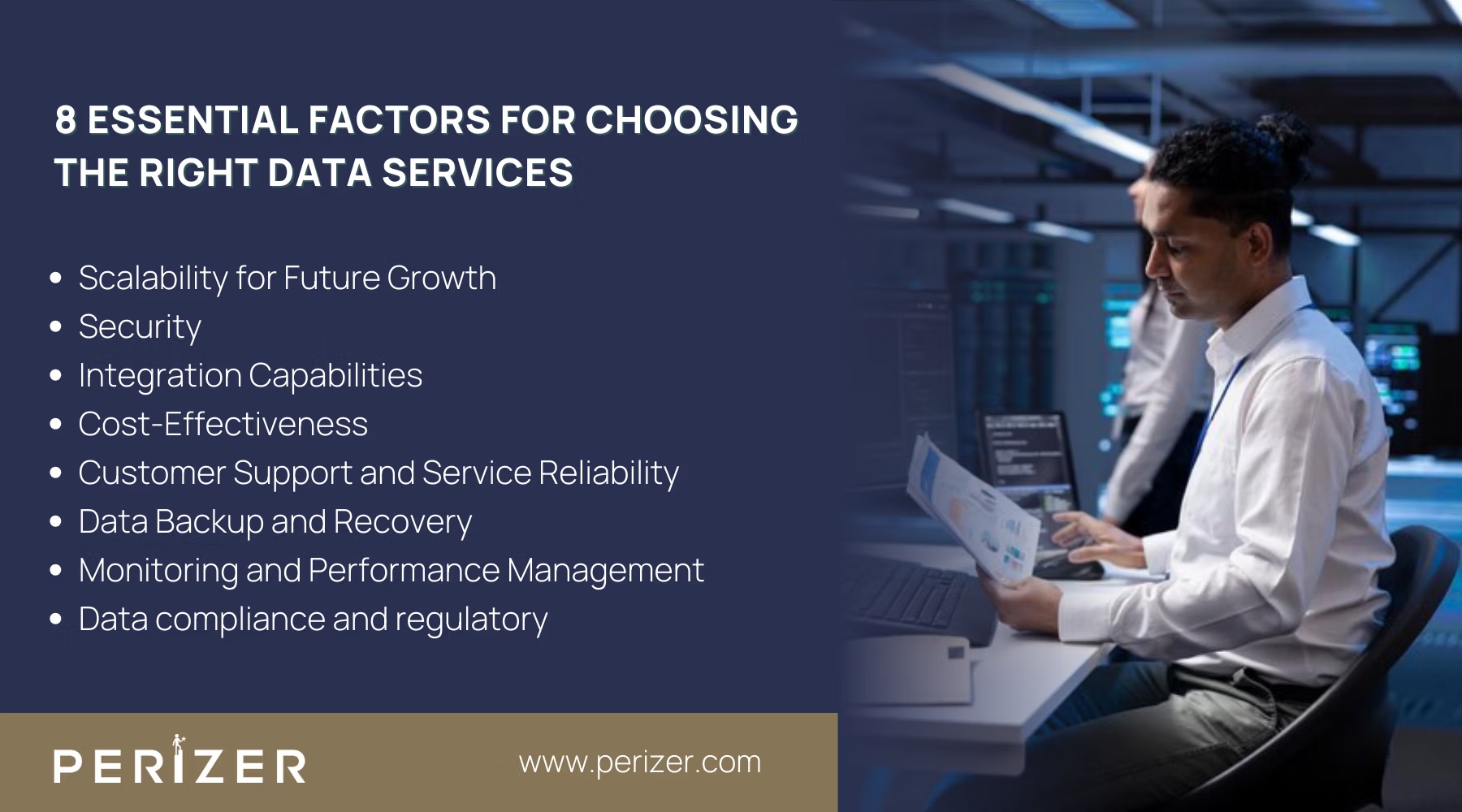How to Choose the Right Data Services for Your Business Needs
Discover how to choose the right data services that ensure scalability, security, and seamless integration, empowering your business to grow.

Choosing the right data services that efficiently store, manage, and analyze your data is essential. These services are important as they support your current operations and provide the scalability, security, and integration needed to keep your business competitive. As your business generates more data, it's important to select a service that aligns with your specific needs and future growth potential. The key is understanding your business requirements, foreseeing, future expansion, and ensuring that your chosen data services integrate seamlessly with your existing technology infrastructure.
This guide helps you choose the right data services for your business by focusing on the most important factors that ensure your business's success and growth.
8 Key Factors for Choosing the Right Data Services

1. Looking at Scalability for Future Growth
Scalability is a big deal when choosing data services. As your business grows, so will your need for data storage and processing power. You need a service that can grow with you, whether that means adding more power to existing servers or spreading the load across more servers. But it’s not just about adding capacity it’s about doing so without disrupting your business.
How to Ensure Scalability?
To figure out if a service is scalable, start by thinking about your future data needs. Will the service automatically scale up when you need more resources, or will you have to do it manually? Auto-scaling is a great feature because it saves time and ensures you’re not paying for resources you don’t need.
Also, consider the types of data work you’ll be doing in the future. Will you need to handle more real-time data analysis or complex machine-learning tasks? Choosing a service that can easily scale to meet these demands will save you headaches down the road.
2. Making Security a Priority
In a world where data breaks are becoming more common, securing your data is non-negotiable. When choosing a data service, you need to think about more than just the basics like encryption. Security should be woven into every part of the service, from how data is stored to how it’s accessed and protected from threats.
How to Choose a Secure Service?
Start by checking if the service uses strong encryption standards like AES-256, both for data at rest and in transit. It’s also important to control your encryption keys having this control ensures that only you can decrypt your data.
Access control is another key aspect. Look for services that offer role-based access control (RBAC), which lets you decide who can access certain data based on their role in your company. Advanced services might also integrate with your existing security systems, making it easier to keep your data safe.
Beyond that, consider how the service handles potential security threats. Does it offer real-time monitoring and alerts for suspicious activity? How quickly can it respond to a breach? A service that keeps detailed logs of all activity can also help you stay compliant with regulations and give you peace of mind.
3. Ensuring Smooth Integration with Your Systems
Integration capabilities are important for making sure your data service fits into your existing tech setup. The service should not only work well with your current systems but also improve how data flows between them.
How to Evaluate Integration?
Start by mapping out the systems you’re already using, like CRM, ERP, and marketing tools. Look for data services that offer easy-to-use APIs (Application Programming Interfaces), which are essential for connecting different systems. RESTful APIs are common, but depending on your needs, you might also need support for other protocols like GraphQL or gRPC.
Consider whether the service can handle both real-time data integration (for when you need data updated instantly) and batch processing (for handling large amounts of data at specific times). Having both options gives you flexibility depending on your business needs.
Lastly, consider using services that offer integration platforms as a service (iPaaS). These platforms make it easier to connect different systems and manage data flow, saving you time and reducing the complexity of your data management.
4. Weighing Cost-Effectiveness Over the Long Term
Cost is always a factor, but it’s not just about finding the cheapest option—it’s about getting the best value for your money over time. This means looking at the pricing models, understanding the total cost of ownership (TCO), and making sure the service will still be valuable as your needs grow.
How to Assess Cost-Effectiveness?
Start by comparing different pricing models. Pay-as-you-go options can be great if your data needs vary, but subscription-based models offer more predictable costs, which might be better if your needs are stable. Make sure you understand how costs will increase as your usage grows and watch out for hidden fees like extra charges for data transfer or storage.
Also, think about the long-term costs, including maintenance, support, and upgrades. A service that requires a lot of manual work or lacks automation could end up costing you more in labor over time. Don’t forget to consider the cost of any downtime services with strong Service Level Agreements (SLAs) that guarantee uptime and performance can help avoid these hidden costs.
Finally, think about how the service’s costs will scale with your business. A solution that’s affordable now might become too expensive as your business grows. Look for services that offer tiered pricing or discounts as your usage increases to help manage costs as you scale.
5. Evaluating Customer Support and Service Reliability
Even the best data services can run into issues, so having reliable customer support is crucial. The quality of support you receive can make a big difference in how quickly problems are resolved, helping you avoid downtime and keep your business running smoothly.
How to Assess Support and Reliability?
When evaluating customer support, consider what support options are available. Does the service offer 24/7 support, or are there limited hours? How can you contact them by phone, email, or chat, and which method is the quickest? If your business depends heavily on its data services, having access to a dedicated support team or account manager can be a huge plus.
Also, look at the service’s reliability. Check their track record for uptime and see how they handle maintenance and updates. A reliable service will give you plenty of notice for any planned downtime and work to minimize the impact on your business.
Finally, consider the tools the service provides to help prevent issues in the first place. Do they offer automated monitoring and alerts? Some services even use predictive analytics to spot potential problems before they happen, allowing you to take action before your business is affected.
Don’t forget to check out the service’s resources beyond direct support. A good knowledge base, an active user community, and detailed documentation can help your team solve problems on their own. Training resources like webinars and tutorials can help you and your team get the most out of the service.
6. Maintaining Data Backup and Recovery
Data loss can be tragic for any business, making data backup and disaster recovery essential components of your data service strategy. You need to ensure that your data is not only backed up regularly but also easily recoverable in case of an unexpected event like a cyberattack, hardware failure, or natural disaster.
How to Choose a Service with Strong Backup and Recovery?
First, check the backup frequency and retention policies of the data service. Daily backups are a minimum, but for businesses with high transaction volumes, more frequent backups might be necessary. Also, consider how long the service retains backups and whether they offer off-site or cloud-based backup options, which add an extra layer of security.
Next, evaluate the service’s disaster recovery capabilities. How quickly can they restore your data after a loss? Look for services that offer rapid recovery options, such as snapshots or real-time replication, which can significantly reduce downtime in case of a disaster.
Finally, test the backup and recovery processes. Regularly scheduled drills or tests ensure that when disaster strikes, your team knows exactly how to restore critical data without delays.
7. Monitoring and Performance Management
Even after you’ve set up your data service, ongoing monitoring is essential to ensure it continues to perform optimally. You need to keep an eye on system performance, data flow, and usage patterns to catch potential issues before they escalate into bigger problems.
How to Implement Effective Monitoring
Choose a data service that offers comprehensive monitoring tools, including dashboards that provide real-time insights into system health, performance metrics, and usage statistics. These tools should allow you to set alerts for unusual activity or performance drops, enabling you to respond quickly to maintain smooth operations.
Advanced monitoring features might also include predictive analytics, which can identify patterns that could lead to future problems. By addressing these issues early, you can prevent disruptions and ensure that your data services continue to meet your business needs.
8. Data Compliance and Regulatory Requirements
Compliance with data regulations is not just a legal necessity but also crucial for maintaining trust with your customers and partners. Depending on your industry, you may be required to follow specific data protection laws such as GDPR, HIPAA, or CCPA.
How to Ensure Compliance?
When choosing a data service, ensure that it complies with the relevant regulations for your industry. This includes data storage, access controls, and reporting requirements. A good data service will provide you with the tools and documentation needed to demonstrate compliance, such as audit logs and encryption standards.
Also, consider the service’s ability to conform to changing regulations. Data laws are constantly evolving, and your data service should be able to keep up with these changes, providing updates and support as new regulations come into effect.
Conclusion
Selecting the right data services for your business is not a decision to be taken lightly. It's about more than just finding a solution that works today; it's about choosing a service that will support your business as it grows and evolves.
Understanding your current needs, anticipating future demands, and aligning these with your existing technology are crucial steps in the process. By preferring factors like scalability, security, integration capabilities, cost-effectiveness, customer support, and data backup and recovery, you can ensure that your chosen data service not only meets your immediate requirements but also adapts to your business’s future challenges and opportunities.
FOCUSED, FAST, GOVERNMENT READY
Stay Tuned With Our Latest Insights

Staff Augmentation
Learn how to select the perfect IT outsourcing partner to promote your team’s capabilities, improve productivity, and drRead more...

Staff Augmentation
Find the perfect staff augmentation partner by aligning your goals, evaluating expertise, managing costs, and ensuring aRead more...

Cyber Security
We focus on understanding the needs, behaviors, and expectations of your users through extensive user research. This infRead more...